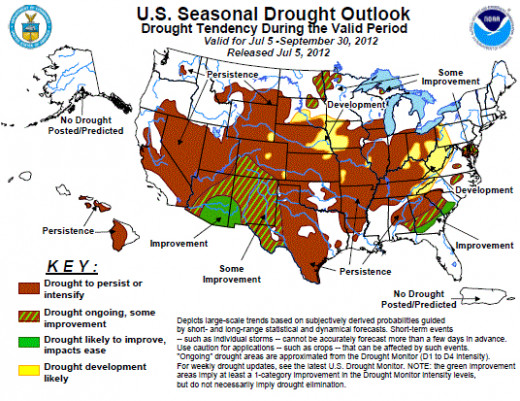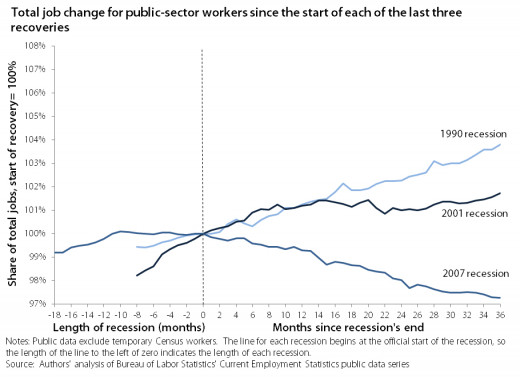Can Mr. Romney Deliver A Prosperous Economy?
Full disclosure: I could never vote for Mr. Romney. Infamously, he made climate change a punchline, even as the Arctic sea ice hit a record low volume last month: compared with 1979 levels, it is down 80%. Yes, four-fifths of the way to zero.
Back in the USA, the past summer's drought--typical of what climate models tell us to expect more and more often--cost us an estimated $25 billion in insured crop losses alone. It's already kicked off another spike in global food prices; similar events in Russia in 2010 helped jump-start the Arab Spring, leading to the Libyan Revolution and the current Syrian civil war.
Meanwhile, Mr. Romney is "unsure" of the reasons for the warming we are observing today:
Scientists are nearly unanimous in laying the blame for rising temperatures on greenhouse gas emissions… [But] climate change has been going on from the beginning of the world… Even the apparent unity among scientists is not a sure indicator of scientific fact.
So Mr. Romney is not going to set rational policies in the best climatic--which means economic--interests of this nation.

However, let's forget all that; some (unlike me) may feel that there is no climate crisis, or that we can't do anything about it.
But everybody would like to see a more fiscally secure and properous America. Can Mr. Romney deliver that?

- Dueling studies in new ads by Romney and Obama - The Washington Post
FACT CHECKER | Romney and Obama both like to point to “independent” studies.
His prescription consists of massive tax cuts, which he expects to stimulate the economy via the private sector. These cuts are to be paid for by the elimination of deductions and other simplifications of the tax code.
The trouble is, analysts do not find enough potential savings in deductions and other simplifications to compensate for the tax rate cuts, expected (as President Obama pointed out) to amount to $5 trillion over ten years:
The difficulty is that there is no fully detailed Romney plan that explains how he would reconcile his twin goals of reducing tax rates across the board and then closing enough loopholes to make it revenue neutral. The Tax Policy Center concluded it could not be done without raising taxes on the middle class — hence the Democratic ads — but the head of the Tax Policy Center cautioned: “I don’t interpret this as evidence that Governor Romney wants to increase taxes on the middle class in order to cut taxes for the rich, as an Obama campaign ad claimed. Instead, I view it as showing that his plan can’t accomplish all his stated objectives.

- The presidential debates: Back in the centre, back in the game | The Economist
"Lexington's" take on the first presidential debate, a version of which appeared in the October 6 print edition: "AFTER months of firing up core supporters in swing..."
The respected conservative British magazine, The Economist, agreed:
Yet on the hardest question--explaining how he would keep his pledge to lower tax rates across the board while avoiding adding to the deficit and at the same time avoiding regressive changes to the tax code that would hit the middle classes more than the wealthy--Mr. Romney again failed to provide clear answers. He also repeated false claims about Mr. Obama cutting hundreds of billions from Medicare programmes for the elderly.

- Experts Say Romney's Defense Plan Doesn't Add Up | Defense News | defensenews.com
Republican presidential candidate Mitt Romney promises to increase defense spending by close to $2 trillion over the next 10 years. But his plans have people asking: where would the money come from?
This trouble is worsened by Mr. Romney's plan to increase military spending. His platform calls for raising defence spending to 4% of GDP, and increasing the active-duty military roster by 100,000. The projected 10-year cost: $2 trillion.
Todd Harrison, a senior fellow for defense budget studies at the Center for Strategic and Budgetary Assessments, commented on Romney’s plan, as reported in Defense News:
If you put all of the promises together, it doesn’t all add up. The administration may change, but the math remains the same. If you want to increase spending on defense over the next decade and reduce the deficit, then that necessarily means sharp reductions in Social Security, Medicare and Medicaid or sharp increases in taxes, or some combination of the two.
The picture that emerges is that Mr. Romney will, if he carries out his plans, be forced to eviscerate government. I understand that Mr. Romney, like most Republicans, wants a smaller government. But there's 'smaller' and then there's 'ineffective.' Do we really want the latter?
And if we are willing to tolerate the losses of service--more crowded classrooms, closed parks, longer lines and more restricted hours at the license bureau, tax office or library--are we sure that there isn't a hidden cost?

A largely unremarked facet of the slow recovery over the last three years is the loss of public sector jobs, and its impact on the wider economy. According to the Economic Policy Institute, state and local governments have shed 627,000 jobs since June 2009. That is large, but not compared to the 'jobs gap' of 9.8 million. (That's the number of jobs which would bring the economy to 'full employment.')
But there are three indirect job costs:
…the jobs the public sector should have gained just to keep up with population growth, the jobs lost in the private sector due to direct public-sector job declines, and the jobs likely lost when state spending cutbacks on transfer programs were made.
These bring the total 'jobs deficit' to 2.3 million.
The EPI continues, "If all of the 2.3 million jobs had been filled, it is likely that the unemployment rate would now be between 6.7 percent and 7.5 percent." They add that this jobs deficit creates "an enormous drag on the economy."
So what will be the impact of another round of government layoffs on the wider economy? Will increasing the 'jobs deficit' still more lead to a buoyant economy? Or will this be yet another "enormous drag?"

Lastly, I must note a painful irony: Mr. Romney, in his infamous "47%" remarks, decried those who supposedly identify themselves as victims and refuse to take responsibility for their own actions and well-being. Yet he paints the entire country as a 'victim' of Mr. Obama's well-intentioned but misguided "trickle-down government" policies.
Apparently, all responsibility lies at Mr. Obama's door; the least effective Congress in many decades gets a free pass; the Republican policy of austerity and especially its recessionary consequences remain unacknowledged.
It may be that some austerity is merited. Certainly the deficit situation needs to be addressed. But is the Mr. Romney's plan really the way to do that? It's hard to tell, since he won't tell us just what his plan really is.
He does tell us that his tax cuts are 'pro-growth,' and he does tell us that he will provide 'leadership.' But apparently he wants us to follow him blindly.
Update: 10/16/2012
Following two Presidential debates, and one Vice-presidential one, Mr. Romney still can't or won't say just how he will pay for his proposals. (I'd elaborate, but what more is there to say? We still have no specific accounting of his numbers on this crucial point.)





